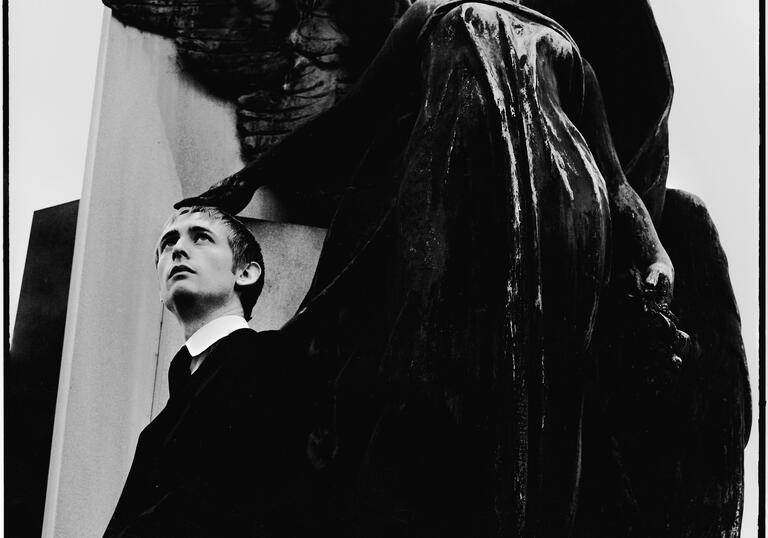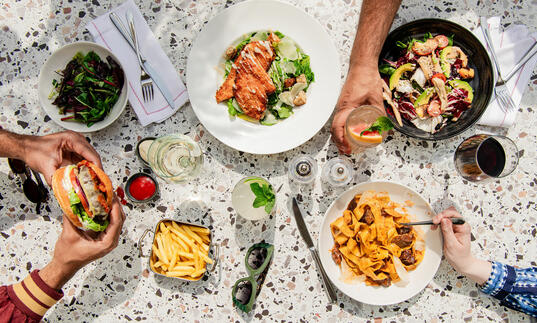After two pandemic-related postponements, The Divine Comedy are finally free to kickstart their five-night residency at the Barbican, celebrating national treasure Neil Hannon’s sophisticated, informed, often witty but always artful pop as he leads a specially expanded line-up through two classic albums each night. Welcome to: Venus, Cupid, Folly, & Time: 30 Years of the Divine Comedy, which takes its name from Agnolo Bronzino’s painting, circa 1545, ‘because it sums up everything I’ve ever written about,’ says Hannon. ‘Sex, love, a lot of folly, and the passing of time.’
Time has indeed passed since the residency’s original date of October 2020, when The Divine Comedy’s similarly career-spanning box set was released. As compensation, Hannon staged a one-off ‘hits and fan favourites’ performance to a drastically reduced audience (albeit bolstered by an online stream of the show). ‘I enjoyed myself, actually,’ says Hannon. ‘A smaller audience took the pressure off, and I could concentrate on the singing – which you’d think I’d usually do! But sometimes you’re more interested in giving a “good show”.’
With around 140 songs to perform, Hannon and the 11-piece band (the usual sextet plus extra guitar, brass and strings) have been rehearsing madly, and Hannon is still thinking more about the music than putting on a “good show”,’ he warns. ‘There is no fancy production, no crazy lighting and we’re not dressing up! I just need to get from one end of each album to the next. I’ll have a lyric sheet in front of me, but if you get the first line right, you’re usually away.’
1) Liberation (1993) / Promenade (1994)
With its R.E.M. influences, the original Divine Comedy’s trio’s debut album Fanfare For The Comic Muse (1990) proved to be a false start. Once Hannon assumed sole creative control, a new line-up recorded the appositely named album Liberation. ‘I suddenly realised I could do whatever I liked: I could live my dreams!’ he says. ‘I was fascinated by synth-pop, elements of prog, The Beatles, classical, jazz, chanson, and my all-time hero is Scott Walker. I also ate books and movies because, at the time, I wasn’t a social animal. But there was still a frisson of a youthful sex drive! The Divine Comedy became music I hadn’t heard yet, apart from Scott’s late ‘60s albums, a kind of orchestrated music noir.’
Amongst Hannon’s other obsessions were F. Scott Fitzgerald, E.M. Forster, E.L.O. and Winnie the Pooh, suggesting a bookish, playful persona. With hallmarks of Jacques Demy’s film, The Umbrellas of Cherbourg, the band’s second album Promenade was a benchmark of wistful romance in song form: one day in the life of a young couple in a seaside town, embracing a rain shower, a funfair, a conversation with God, an ocean rescue and a possible flight from the balcony into the future. ‘A wondrous, romantic, futile, intellectual adventure,’ according to Hannon.
2) Casanova (1996) / A Short Album About Love (1997)
By the third album, Hannon was casting himself as a debonair dandy and lothario figure; part Noël Coward, part Michael Caine in Alfie. Casanova – ‘I’d sung about my desperation to meet
women, and then I finally did!’ – became his big commercial breakthrough, driven by the irresistible three-minute hits ‘Something for The Weekend’ and ‘Becoming More Like Alfie’. ‘I’d seen the Britpop scene brewing,’ he recalls, ‘and I loved a lot of what informed Britpop, like The Kinks and movie soundtracks. I needed to get on this bandwagon!‘
‘Reading my pop handbook, it said, you need a follow-up hit quick or fans will move on. I only had enough for a mini album, so we recorded it, semi-live, with the Brunel Ensemble, a small orchestra from Bristol. I pinched film director Krzysztof Kieślowski’s title A Short Film About Love, and released it on Valentine’s Day, nine months after Casanova. I need to reassure ticketholders tonight; you won’t be short-changed! We’ll stick in a few more.’
3) Fin De Siècle (1998) / Regeneration (2001)
‘Fin De Siècle was me saying, “But I’m an artist!” and directing things in strange and wonderful directions. There’s crazy stuff like ‘Eric The Gardener’ but also ‘National Express’ and ‘Generation Sex’ – our biggest hits. But by the end of the ‘90s, the scene had changed. Nobody wanted a man flouncing around with an orchestra behind them. So, after the mania of Britpop, in a massive attempt to not go down with the ship, I made Regeneration, which was more serious with more guitars. It was me, famed producer Nigel Godrich and my excellent band on an equal footing. Call me an egomaniac, but I felt disconnected and I wanted more fun.’
4) Absent Friends (2004) / Victory For The Comic Muse (2006)
‘In 2002, I split up the band I’d kept through the ‘90s and started again, and I needed to think about how I wanted to sound and write – perhaps back to my roots? So, I had this big, lush orchestral sound. I always think I’m going to write like Scott Walker or Jacques Brel, but it always turns out like me!’ Victory For The Comic Muse was pretty out there again, a big box of oddities. Every song was built on a different concept. Like ‘Count Grassi’s Passage Over Piedmont’ was a travelogue of a fictional Italian balloonist and ‘The Light of Day’ was about my divorce!’
5) Bang Goes The Knighthood (2010) / Foreverland (2016)
‘A lot of Bang Goes The Knighthood was kicked off by the British banking crisis of 2008. But I also love ‘70s TV icons Reggie Perrin and Monty Python, men in bowler hats getting the 8.20am train, which is even more anachronistic after the pandemic, but a cliché gives you a hook to pin ideas around. The recording was more “just me” than usual; we were on our uppers after leaving Parlophone, so the budget was more shoestring, but I still think it’s a very good record. Foreverland is my all-loved-up album – though it’s more about the “afterwards,” like, “I’ve met my soulmate, but this isn’t perfect like I imagined!” To me, Foreverland sounds red, gold, brown and green. There are the usual harps and strings, but the sound is subtly different to the other records.’
Produced by the Barbican






